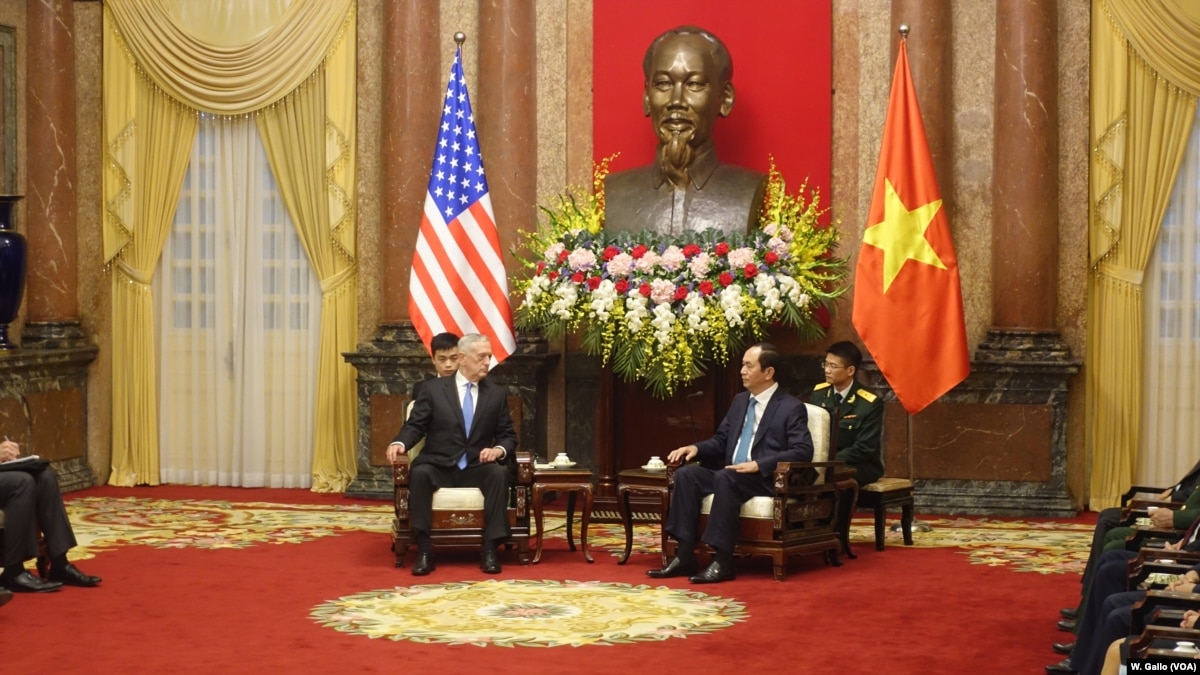
U.S. Defense Secretary James Mattis visited Vietnam twice this year and suggested in October stronger relations as China bears down on Vietnamese maritime claims. In the Philippines a month later, Mattis swore to uphold a decades-old military alliance that helps Manila resist China. A U.S. naval ship passes through the South China Sea every couple of months or so as support for keeping the resource-rich waterway open, not just for Chinese use.
Moments like these raised Southeast Asia’s confidence in U.S. support after some nervousness when President Donald Trump took office in 2017. Mattis will quit January 1, in turn shaking that confidence.
Beijing has drilled for oil, built up islands or passed ships in South China Sea waters claimed as well by Vietnam, the Philippines and three other Asian governments. Weaker than China, the Southeast Asian states hoped the United States would help. Mattis advocated close relations with allies to resist authoritarian states.
“I suspect many leaders, be they in Southeast Asia or elsewhere, will just roll their eyes and think, ‘here we go again’” after Mattis leaves, said Sean King, vice president of the Park Strategies political consultancy in New York. “Mattis is different, as he…holds such a critical life-and-death cabinet post and is a firm believer in America's alliances, as evidenced in his resignation letter to Trump.”
The U.S. Asia alliance spans democracies from Japan through South Korea and Taiwan into Southeast Asia. Many of those countries are trying to pare back the influence of China.
Sudden resignation
“It is clear that China and Russia, for example, want to shape a world consistent with their authoritarian model — gaining veto authority over other nations’ economic, diplomatic, and security decisions — to promote their own interests at the expense of their neighbors, America and our allies,” the 68-year-old ex-Marine Corps general wrote in his resignation letter to Trump.
“That is why we must use all the tools of American power to provide for the common defense,” the December 20 letter says.
Asian leaders found “reliability” in Mattis’s ties with Asia, said Huang Kwei-bo, vice dean of the international affairs college at National Chengchi University in Taipei. The defense secretary made a particular impression by attending the Shangri-la Dialogue twice, telling Asia’s major annual defense summit in 2018 that the U.S. government would help its “partners” improve protection of their maritime interests.
Vietnam, the Philippines, Brunei, Malaysia and Taiwan dispute Chinese expansion in the resource-rich South China Sea. Taiwan and Japan vie with Beijing separately over control of the East China Sea.
“He played a sort of force of reliability because at least as defense chief he did what he said and then when he made contact with every other country he was steady, giving them a sense of reliability, so other people’s trust in the United States won’t fall so fast,” Huang said.
Mattis quit a day after Trump announced the U.S. troop withdrawal from Syria, a move opposed by the defense department. European allies France, Sweden and the U.K. have already voiced concern about the resignation.
Among countries that claim the South China Sea, Vietnam will probably “miss” Mattis the most, King said. Vietnam has stood firmest against Beijing, he said, while other Asian maritime claimants look to the United States for security but to China for economic support.
Wait-and-watch phase
The U.S. withdrawal from Syria could show that Trump and his eventual new defense chief will later isolate Washington from its Asian allies, King said. China, he said, “would fill the vacuum.”
For the short term, expect leaders in Asia to wait nervously again as they did after Trump’s inauguration, analysts suggest.
“President Trump is playing demolition derby with his own cabinet and he's going to be distracted and this is not the time to mount any significant foreign policy initiatives,” said Alan Chong, associate professor at the S. Rajaratnam School of International Studies in Singapore.
“If there’s any more restrained member of Trump’s cabinet left, now is not that time, because a whimsical management team would pull the rug from under their feet at any time,” he said. “So I think things will remain static.”
Trump will probably look for a new defense chief “who will listen to him,” Huang said.
Trump has said he would appoint Deputy Defense Secretary Patrick Shanahan as acting secretary on January 1 to replace Mattis.
Read More US Defense Chief’s Resignation Stirs Doubts in Asia about Help Resisting China : http://bit.ly/2BFzdlD
No comments:
Post a Comment